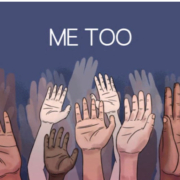OpEd: Talking about Harassment in the Workplace
Guest contributed by Stacey Engle
Women empowerment movements have been a prevalent force over the past year, from #metoo to #timesup.
The individual and collective impact of these movements has varied, as have the conversations we have had surrounding these topics – both at work, and at home.
At Fierce Conversations, we wanted to get a sense of how recent social movements have impacted the workplace, if at all. We asked more than 1,000 full and part-time employed individuals in the U.S. questions about current social movements, along with how their personal outlook has shifted over the past year.
Fifty-seven percent of those surveyed have discussed gender equality (including the #MeToo and #TimesUp movements), yet most of these conversations are occurring with friends and family, not within the workplace:
- 44% have discussed with friends
- 40% with family
- 25% with colleagues
- 8% with boss/supervisor
- 3% with company leaders
While we weren’t surprised to see that the topic came up more with those we feel closest to outside the office, these low numbers within the workplace signal a clear disconnect between issues that matter and affect our lives, and the amount of recognition these issues are receiving in our places of work.
And these numbers only increase when we look at gender and age. More women than men (58% vs 47%) have had conversations about gender equality; 49% of women have discussed the topic with their friends, while just 37% of men say the same.
Younger Americans are also talking about these issues at much higher rates. More than two-thirds of those 18-29 have had a conversation about these movements; just 53% of those 60+ say the same.
Given the reality that older men make up the majority of CEOs and company leaders today, these numbers are concerning. These social issues may not be top of mind for these leaders, but it’s imperative that they recognize their employees are discussing these matters outside of work, and respond accordingly by addressing them within their organizations. It is imperative for women in leadership roles, even those not at the very top, to ensure these are topics aren’t brushed under the rug.
The good news is that, despite these conversations not taking place in droves at work, these movements appear to be making an impact in how empowered individuals feel today than they did a year ago.
Almost half (48 percent) of those surveyed said they are more likely to stick up for themselves than they were a year ago, and another 40 percent are more likely to stand up for a colleague. Thirty percent are more likely to address a colleague directly for inappropriate behavior, such as a racist joke or unwelcome flirting, than they were a year ago.
This data varies by gender; 55 percent of women are more likely to stick up for themselves than they were a year ago; just 36 percent of men say the same. Forty-two percent of women are more likely to stand up for a colleague; just 34 percent of men say the same.
There is very cleary a more significant shift here with women in their comfort level in speaking up, and we believe with the right conversation skills, these numbers can be even greater.
Conversations around equality are necessary, and every employee should feel comfortable discussing these issues, especially if they have experienced or witnessed any type of discrimination. Not feeling comfortable enough to speak up is the reason we have seen systemic issues at many organizations over the past year.
A barrier that many struggle with, however, is how to come up with an organizational perspective on these issues, if they don’t truly understanding the specific issues their company is facing. Here are some tips we recommend to move in the right direction:
- Ask your employees the right questions. Many team meetings and one-on-ones are focused on the work at hand and don’t venture into larger, equally important topics. Change that. Ask your employees how they feel about the diversity of the organization, raise any issues you have seen and talk about them directly. Putting issues out in the open leads to others feeling safer to bring up concerns.
- Encourage your employees to stand up for themselves. The results of our survey show some great progress in more individuals addressing issues in head on, which in many cases can lead to issues being addressed before they get out of hand. When issues are addressed early and often, everyone benefits.
- Be accessible. The survey found that while only 30% are more likely to address a colleague for inappropriate behavior directly–this includes behaviors such as racist jokes, unwelcome flirting, etc.–just 20% are more likely to address said behavior with a supervisor. It’s important for employees to be able to confront their colleagues directly, but if the issue is not resolved, they need to feel comfortable bringing up the issue to their supervisor. Knowing your employees can and do share with you any issue they have is the best and most efficient way to ensure you can address any larger trends that arise.
- Ensure you, and your employees, have the tools to have tough conversations. You, and all of your employees, must have the skills to bring up hard issues and address them head on. Avoiding, ignoring or brushing small issues under the rug will only lead to larger, more detrimental problems down the line. Given the right tools, confrontation can be a great learning opportunity for everyone involved.
At the end of the day, conversations about gender equality are necessary and need to happen to ensure your organization is addressing any and all issues as they arise, and that your employees feel safe and encouraged to come forward if necessary.
Stacey Engle believes meeting the needs of clients start with truly understanding the challenges they face. As a result, she is always connected—to clients, the latest trends, and the newest opportunities.
Stacey is a passionate self-starter with over ten years’ experience helping to build businesses through smart go-to market and innovative people strategies. As executive vice president sales and marketing at Fierce Conversations, Stacey leads the marketing and sales strategies, along with branding efforts for the company. Over the past 7 years, Stacey has been key a driver in Fierce’s double digit growth, landing the company consistently on the Inc.5000 list as well as receiving consecutive Best Places to Work and design awards.
Stacey is very passionate about community work, serving on boards and offering pro-bono work with the University of Washington, various arts organizations, and community initiatives. She was recently awarded the Outstanding Alumni Mentor Award from the University of Washington with her work in founding a professional development board that connects students with transformational experiences from workshops to global opportunities.
Disclaimer: The opinions and views of guest contributors are not necessarily those of the glasshammer.com









